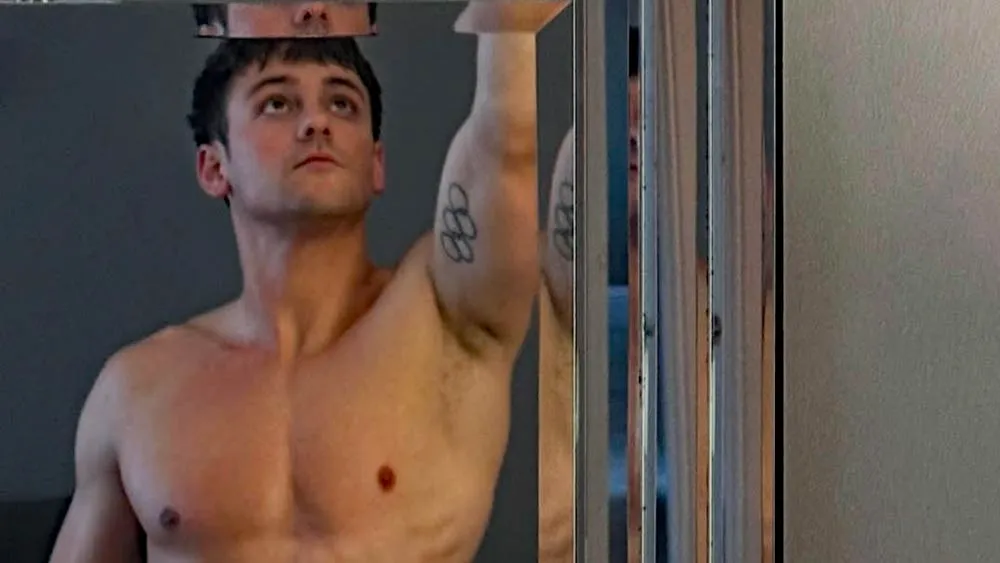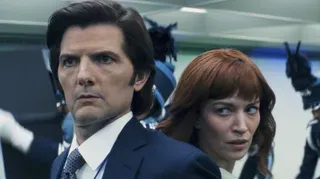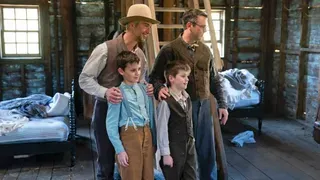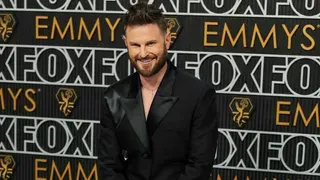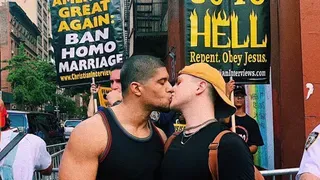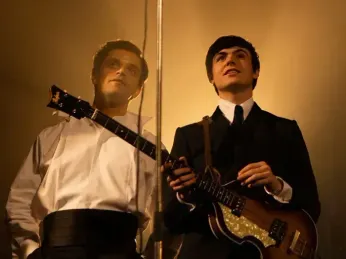
9 hours ago
San Francisco Jewish Film Festival, part 1: Some pearls in an ocean of 45th anniversary cinematic offerings
Brian Bromberger READ TIME: 1 MIN.
The San Francisco Jewish Film Festival (SFJFF), running from July 17 to August 3 in San Franciscio and Oakland, is celebrating its 45th anniversary. Last month, SFJFF’s sponsoring organization, the Jewish Film Institute (JFI) was notified that the federal government had rescinded two NEA grants, with a combined total of $55,000.
This was disappointing news at a time of rising antisemitism and cultural division, since the festival’s work has never felt more essential. Still, SFJFF promises that it will present a “robust slate designed to challenge perspectives, expand notions of Jewish identity, and provide a space for nuanced conversation.
SFJFF45 presents 70 films from 10 countries, screening at eight theaters. The program also includes seven JFI-supported titles, which are projects that received support from the organization’s growing Grants and Residency programs.
Executive Director Lexi Leban writes, “We’re thrilled to mark our 45th anniversary by spotlighting bold, visionary artists who are truly meeting the moment, in times like these, when it’s easy to feel divided or overwhelmed. There’s something powerful of standing in solidarity with our in-dependent film and arts community in support of creativity and freedom of expression.”
This year includes many feature films that address LGBTQ+ themes and histories. Publicist Jack S. Song, film festival director Ash, and programmer Dominique are all part of the LGBTQ community. One of its live events will be a reading by non-binary, transgender lesbian actress Tommy Dorfman (“13 Reasons Why”) from her newly published memoir “Maybe This Will Save Me: A Memoir of Art, Addiction and Transformation.” She will have an extended conversation with controversial author Laura Albert aka JT Leroy (“Sarah,” “The Heart Is Deceitful Above All Things”).
Oakland native, actor, rapper, and singer-songwriter and half-Jewish Daveed Diggs (“Hamilton”) will receive SFJFF’s Freedom of Expression Award “for his body of genre-defying work addressing identity, justice, and imagination.” His latest film “Magic Hour” will also be screened at the festival. Here are the first of two review roundups of LGBTQ-specific films.
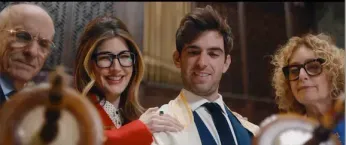
“31 Candles” is a tepid comic entry into what is becoming a bona fide subgenre, the adult bar or bat mitzvah, based on writer/director/actor Jonah Feingold’s own life experience. And yes, it’s another story about a Jewish neurotic in the mold of Woody Allen (but nowhere as good).
Leo Kadner (Feingold), aged 30, makes Christmas movies for a billionaire selling drones across America. He’s in a dead-end relationship with Molly (Djouliet Amara) but uses dating apps looking for real love but only seems to find antisemitic prospects. He encounters his summer camp crush Eva Shapiro (Sarah Coffey) while attending his nephew’s bris. Eva has a job tutoring kids for bar and bat mitzvahs.
To spend time with Eva, whom he’s falling for again, he decides to have a bar mitzvah on his 31st birthday. He can’t decide what to do for his Mitzvah Project, a community service requirement. The only person Leo really relates with is his grandmother Lila (Caroline Aaron, lovely) who is supportive, while his divorced parents trash each other. Of course, the real question is whether Leo will finally grow up.
There’s a significant LGBTQ plot twist which won’t be spoiled, but it doesn’t make the film any better. Romcoms work based on the chemistry of its two leads. While Feingold is okay, Coffey seems miscast as there are no sparks with him.
There are some funny lines and touching moments, but the film never quite comes alive despite Leo breaking the fourth wall to talk with the audience. Last year’s similarly-themed movie, “Between the Temples,” starring Jason Schwartzman and Carol Kane, was more charming and spiritually wise. Still, this at-times-fun, watchable-but-forgettable romp does move breezily through its 90-minute run as it superficially explores tradition and identity, but by its predictable conclusion you will be more than ready to blow out those 31 candles.
The biopic “Midas Man” is a competent but uneven telling of the tragic Beatles gay manager, Brian Epstein, dubbed the Fifth Beatle, a story long overdue. He started as a window dresser in his Jewish family’s furniture store in Liverpool, but his real passion was music. Not knowing what to do with his life, he expands the music department in the store with great success, becoming an expert on the local band scene.
He discovers the Beatles playing at the Cavern Club and is exhilarated by them and their potential. He convinces them to let him be their manager, though he has no experience. But he discovers he has entrepreneurial skills and will manage other groups such as Gerry and the Pacemakers and singer Cillia. He also has illicit encounters with men at Liverpool docks and public toilets, resulting in him being mugged, robbed, and blackmailed at a time when homosexuality was illegal in Britain.
The Beatles and Epstein are mutually fond and respectful of each other, despite their different backgrounds. He secures a meeting with George Martin who will produce the Beatles’ records at Abbey Road Studios. He travels with the Beatles to America as they reach mega-stardom after their appearance on the Ed Sullivan Show (played miserably by Jay Leno).
Epstein meets Tex, an aspiring singer, begins an ill-fated relationship, showcasing his desire to be loved. The Beatles’ fame becomes harder to deal with and Epstein can’t really cope with it, relying on alcohol, barbiturates, and amphetamine pills. He will die of an accidental drug overdose in 1967 at age 32.
The film is primarily Epstein’s story and the Beatles are reduced to cheeky remarks. There’s nothing about his rumored affair with John Lennon during a 1963 vacation trip to Barcelona, featured in the excellent 1991 film “The Hours and Times.” Jacob Fortune-Lloyd is outstanding as Epstein invoking much empathy for him, as is Emily Watson as his supportive mother.
However, the film fails to make a connection between the determined public persona and his ill-fated repressed, painful private life. They seem like two different people. The film does a good job of recreating the early 1960s pop scene with stylish clothes, considering the film had a low budget and two previous directors. There’s nothing new here about the Beatles and they come across almost like cartoonish figures.
The film’s producers couldn’t get the rights to the Beatles music, which is a big drawback. “Midas Man” is serviceable, but Epstein is fascinating enough that he would have been better served with a less conventional narrative approach, that might inspire other filmmakers to see greater potential to capture this visionary, tortured essential element of Beatlemania.
Meredith Monk is a composer, singer, director, choreographer, filmmaker, creator of new operas and theater works, video installation, and a MacArthur ‘genius’ Fellowship. She’s a pioneer of “extended vocal technique” and interdisciplinary performance showcasing her wildly original vocabulary of sound across her three-range octave, often channeling primal, futuristic, even animal-like vocalizations. Her profound cultural influence is finally getting her due recognition in the extraordinary documentary, “Monk in Pieces.”
The film explores her groundbreaking exploration of the voice as instrument that has expanded the boundaries of musical composition, “creating landscapes of sound that unearth feeling, energies, and memories for which there are no words,” abandoning traditional lyrics. It makes skillful use of a rich archive of film, photos, and notebooks, giving us access to her evolution as an artist and her creative process, though surprisingly little about her Jewish roots.
Coming of creative age in the male-dominated Manhattan downtown arts scene of the 1960s and 1970s, she had to fight for recognition and resources. Her reviews were often scathing (and sexist at times), such as “a disgrace to the name of dancing,” “music so simple that it seems simple-minded,” or “it made my cats bite each other,” yet to the musical genius Philip Glass, “she among all of us, was –and still is– the uniquely gifted one.”
The film is organized into chapters often titled by pieces of her work. She was born with an eye condition that prevents her seeing in 3D and her mother (who sang commercial jingles and was often absent) enrolled her in Dalcroze Eurthymics, which teaches musical expression through movement and taught her to concentrate on her voice.
The documentary mentions her two life partners, the choreographer and video installation artist Ping Chong, though Monk’s art always came first, then female opera singer Mieke Van Hoek, whose death at age 56 caused her to write the melancholic “Impermanence.” Now 82, Monk is dealing with mortality issues and it’s poignant watching her entrust her masterpiece “ATLAS” to much younger singer Joanna Lynn-Jacobs for a new production, as she learns to let go.
Having never been a fan of her work (sporadically finding it irritating), the film helped me realize what an original talent she is and appreciate what she’s attempting to accomplish by expanding the boundaries of musical composition and how healing that can be for some people.
We also see how much negative resistance she had to overcome to get her work produced, transforming her into a visionary survivor and inspiration, with paeans from David Byrne and Bjork. The documentary’s highlight is her receiving the National Medal of Arts from President Obama in 2015. “Monk in Pieces” makes her accessible to those unfamiliar with her challenging work. This film is one of the peaks of the festival.
Writer, political activist, professor, Nobel Peace Prize laureate, and Holocaust survivor Elie Wiesel’s (1928-2016) astounding life is profiled in the superb searing documentary “Elie Wiesel: Soul on Fire,” with access to personal archives, original interviews, and hand-painted animation. Wiesel was a lifelong straight advocate for LGBTQ rights. In 1989, he was honored by the Human Rights Campaign and said in his speech, “Those who hate you, hate me. Bigots don’t stop at classes, races, or at lesbians and gays. Those who hate, hate everybody,” words which seem even more relevant today.
Born to a Jewish family in Romania, he was liberated as a skeletal survivor by American troops from Buchenwald concentration camp at age 16. He eventually emigrated to the U.S. and in 1958 his now classic memoir of the Holocaust, “Night,” was published. His amazing book on Hasidic Rabbis, “Souls on Fire,” has also become required reading.
In 1976 he became Professor of Humanities at Boston University, where he taught for 40 years. An awesome storyteller, in his speeches he railed against the “sin of indifference,” the importance of “not remaining silent,” and speaking “truth to power,” becoming the world’s most famous Holocaust survivor. The film has a significant segment in which Wiesel pleads with President Ronald Reagan not to honor SS soldiers alongside German soldiers at the Bitburg cemetery.
“That place, Mr. President, is not your place. Your place is with the victims of the SS. The issue here is not politics but good and evil. And we must never confuse them.”
Where is today’s person of moral conscience to challenge the current administration’s hateful policies in the respectful but forceful spirit of Elie Wiesel? The documentary reveals how driven Wiesel was, suffering from bouts of depression as he rarely opened up even to his close friends.
What this film does so beautifully is rather than give us a comprehensive year by year account of events in Wiesel’s life, writer/director Oren Rudavsky attempts to give us an intimate, emotional portrait, not glossing over his flaws (he was very demanding) but showing how much a similar beacon of human rights and fearless witness is needed today. This film is absolute necessary viewing at SFJFF45.
